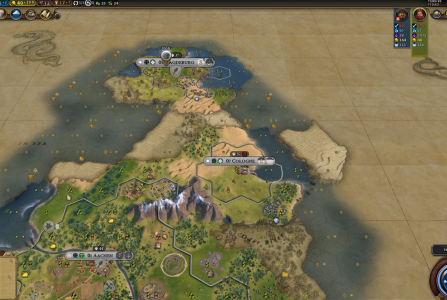R&F had nice work ethic, but that is seriously degraded in GS.
While looking at early development, how do you place your first 5 cities after capital? Closer to have shorter supply lines, or further out to lock in potential necessary resources?
Work ethic is arguably the most overpowered belief in the game at the moment, assuming you have the right landscape and adjacency pantheon to leverage.
It's quite possible to get +6 production holy sites these days, that double down to +12 once you get the +100% holy site adjacency card up and running.
That is simply an enormous amount of production early on, but is somewhat advanced stuff to pull off and so I didn't want to complicate things unneccessarily for you by going into that.
It's hard to tell where you should settle based on your screenshot, because I can't see the northern parts of the map.
But as for the southern part of the map (close to Mongolia), Frankfurt and Berlin both look good, as does Mainz.
You should have settled Trier right at the coast though.
As for general pointers, try to see what yields you can get early on (food+production are important, as well as possible improvements), and try to settle cities closer together.
I usually prefer to settle my cities as closely together as possible, because you will rarely if ever be able to work all tiles anyway (unlike in civ 5 where having 25+ population cities is common).
Frankfurt could probably be settled one tile further west to allow for a city in between Frankfurt and Aachen, but that comes at a risk of loyalty issues and pissing off Mongolia even more, so the choice to settle where you did was ok considering that.
If you had settled one tile further west you could also have settled Berlin further to the northwest, and allowed Aachen to settle at the river near the coast, so that would have given you room for 1 more city, as well as ensuring that Berlin and Trier both got river access.
In general I like to settle tight for this reason, but also forward settle to secure landmass before the AI takes it - even if it means pissing off Mongolia (because you can beat him easily if you play the tactical combat game well).
Resources is less important, you can very often secure that one way or another.
For instance, if you dont get horses then iron is good enough, you only want to make sure that you get some high tech units out so that the combat strength of your cities increase (
if playing defensively/peacefully).
Other than that, its usually possible to also trade for these resources, so try that if you're struggling.
Heck, even one swordsman can be enough, and then just pile on with archers behind him (those dont cost strategic resources).
No big deal though, you can work with this game quite nicely.
The only exception is Trier, which is a strategic liability at the moment, pisses off Mongolia and gives you hardly any benefit because it lacks fresh water.
You also settled it so that you cannot settle near the coast anymore, so there's that as well to consider.
Let's just say - if Trier had been settled by Mongolia and I had just captured that city, I'd consider razing it due to how poorly placed it is and how it takes away settling spots elsewhere.


 I never get Moksha, and never knew until now he had this ability
I never get Moksha, and never knew until now he had this ability